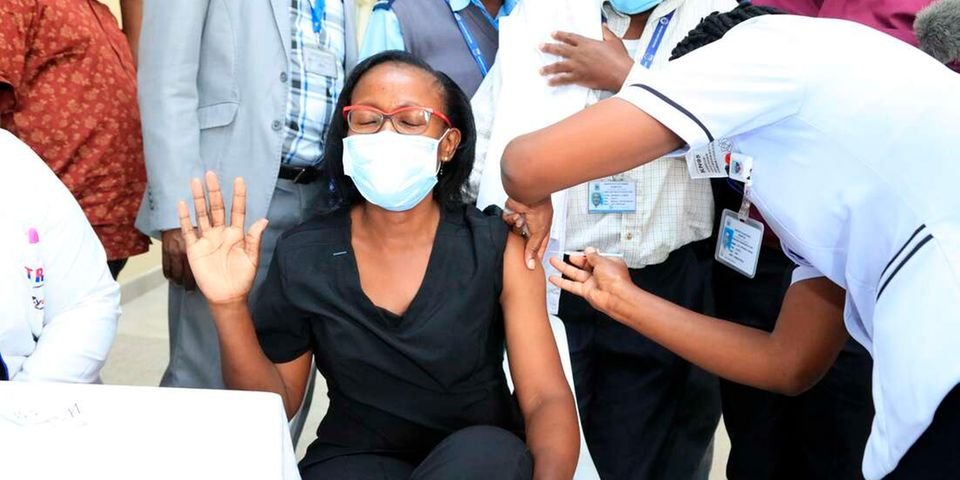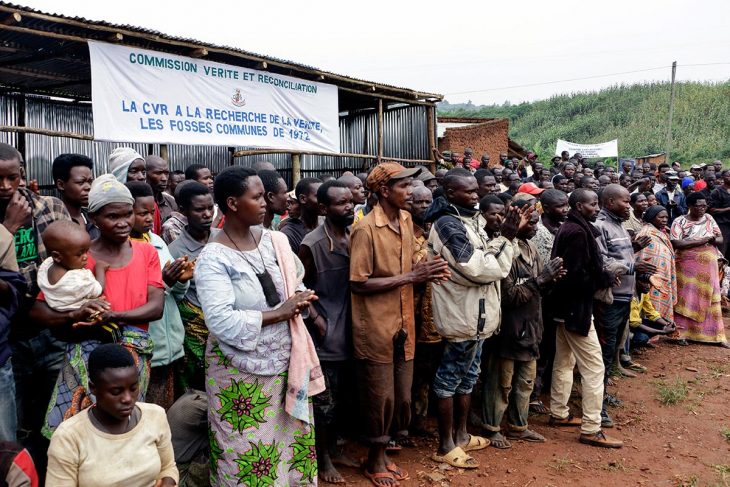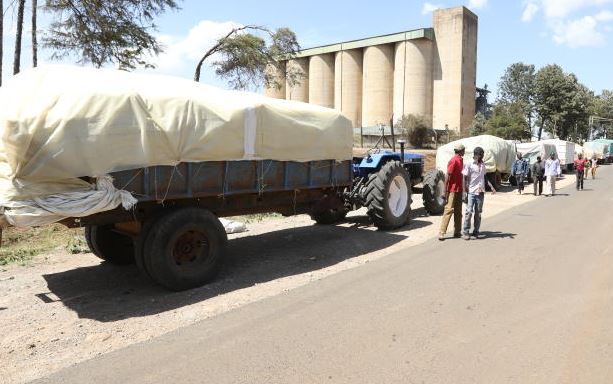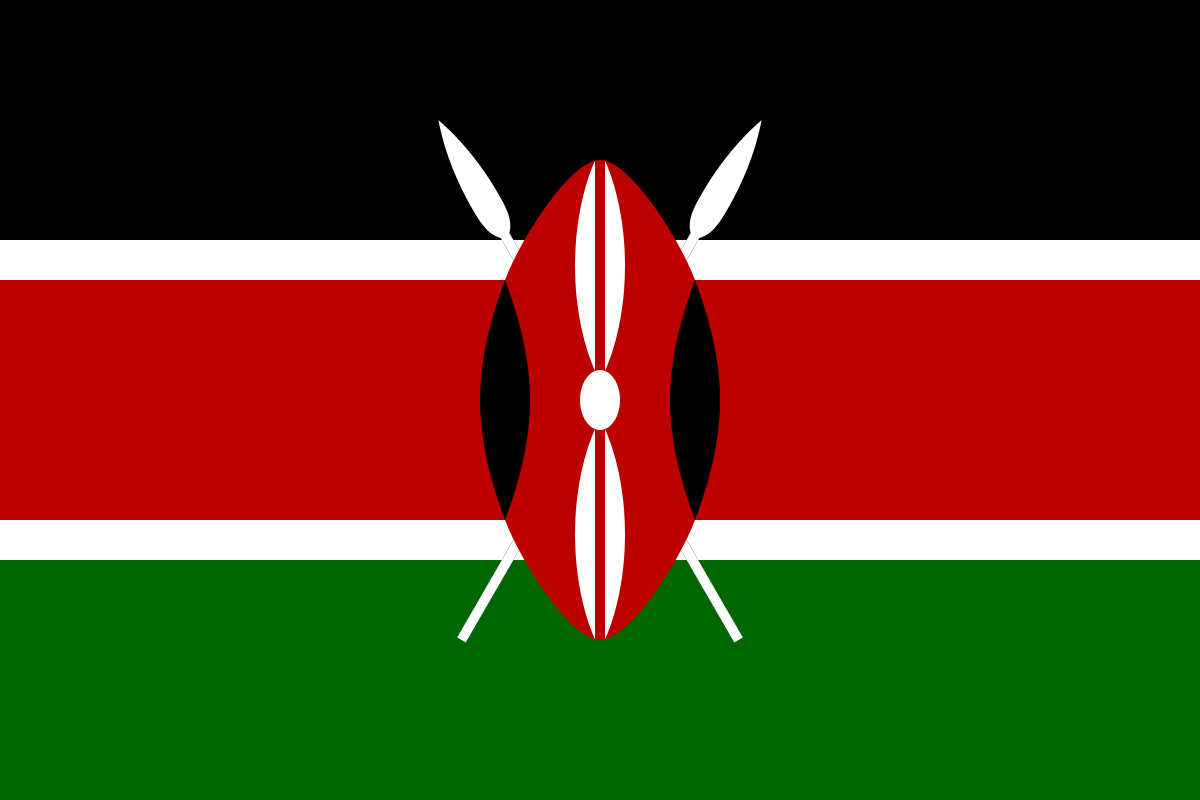On January 27, 2020, in Shombo, villagers gather to watch workers from Burundian "Truth and Reconciliation Commission" (TRC) searching human remains in an unearthed mass grave allegedly dating back to 1972. Photo Onesphore Nigibira / AFP
In 2020, the work of Burundi's Truth and Reconciliation Commission focused on the 1972 massacres, which primarily targeted Hutus. These were grave events, but choosing this period as a priority only fuels accusations that the commission is just a propaganda instrument for the current regime.
The TRC has since January been touring institutions and pressure groups to present its latest activity report. In 2020, the commission went to the central provinces of Gitega and Karusi, and then to Rumonge, Bururi and Makamba in the south. Its work consisted of collecting testimony on the 1972 massacres and exhuming and analysing mass graves.
According to a summary published on February 3 in Kirundi, the national language, the Commission's 2020 report includes six chapters, mostly collections of witness photos, open mass graves and exhumed human remains. The first chapter, presented as the heart of the report, traces the origin, preparation and course of the massacres. It includes provisional lists of victims by category: military, other state agents, ordinary citizens, and foreigners. It also lists the survivors identified to date.
374 people were heard by the TRC. "The Commission has had access to first-hand information, direct actors of the massive human rights violations in 1972 and victims with an average age of 60 years," writes the TRC, which emphasizes that it has not yet heard from all the witnesses of this bloody period. It promises that the hearings will be published, in the coming months, in the form of a book of testimonies.
In terms of exhumations, eight large mass graves have been discovered in Karusi province, containing the remains of 7,348 victims; eleven in Gitega province with bones of 3,630 victims; thirty-four in Makamba province with 1,680 victims; sixteen in Rumonge province with 813 victims; and seven in Ngozi province with 113 victims.
For the time being, "the Commission is provisionally keeping the remains, personal effects of the victims and the instruments that were used" to kill them. Shoes, hats, belts, coins, wallets, identity cards, necklaces, bracelets, rosaries and Bibles are among the personal effects exhumed. Killing instruments include bullets, grenades, machetes, chains, iron bars, plastic ropes, raffia wire and electrical cables.
Planned massacres
According to the report, it all began on 29 April 1972, when Hutu insurgents launched an attack in the south of the country, targeting members of the Tutsi elite in power. Under the presidency of Michel Micombero, a Tutsi, there was bloody repression extending even to regions not affected by the insurrection. Hutus were killed en masse for months on end throughout the country. State agents, teachers, university students, high school students, magistrates, soldiers, gendarmes and those with enviable social status were particularly targeted.
For the TRC, the speed with which the massacres spread, the scale of the killings and the modus operandi prove that there was prior planning
For the TRC, the speed with which the massacres spread, the scale of the killings and the modus operandi prove that there was prior planning. "How can it be explained that massacres starting in Rumonge or Nyanza-Lac [in the south] spread to the whole country the next day with lists of Burundians who were arrested, killed and thrown into pits?" asks the report.
People were picked up everywhere -- in government offices, at roadblocks, on the hills, in shopping centres, and in schools, according to the TRC report. In public services, the modus operandi was the same. A military convoy would arrive, surround the area, a list of names would be read out and those concerned forced into trucks. Once the convoy left, work resumed as if nothing had happened. The lists were generally drawn up by the intelligence services, militants of the ruling UPRONA party and administrative officials, according to the Commission, which says lists of people to be massacred were found in the archives of the Bukirasazi district (province of Gitega) and at the communal office of Buhiga (province of Karusi).
Sorting people by ethnicity
In schools in the south, it was often Tutsi students who made lists of their Hutu classmates, according to the report. At Athénée, a public secondary school in Gitega, students to be killed were identified according to physical aspects such as shape of the jaw and height, states the TRC, citing survivors. Administrative officials would burst into the dormitories, ordering students to stand with their backs to the wall to be identified. After selecting their victims, authorities would take them away and order the others to go back to bed.
In some places, the authorities called a meeting of the inhabitants and then separated them, putting Hutus on one side and Tutsis on the other. The Hutus were then killed and their bodies thrown into pits, abandoned in fields and forests, drowned in the waters of Lake Tanganyika or in rivers. The Commission affirms that helicopters were also used to strafe Hutus grouped together. According to the report, ordinary Tutsis took part in the massacres, working together with the administration and the army.
Most of the mass graves in Rumonge province were discovered near churches, mostly Pentecostal. Christians and their pastors were dumped there, according to the commission. The central regions also had their share of murdered clerics, including the famous abbot and writer Michel Kayoya, who was killed on May 17, 1972, and thrown into a mass grave near the Ruvubu River. In this same region, writes the TRC, some Tutsis were also killed because they opposed the murder of their Hutu colleagues.
Call for a public apology
In the south the pits were dug by men, and in the central provinces by machines. "Before the machines dug the pits, the civil or military authorities would first identify the locations. (...) Very often, the pits were dug between 3am and 6am. Some of the drivers of these machines and trucks carrying people thrown dead or alive into these pits are still alive and have been heard by the TRC. The Commission has their recorded accounts and signed statements.”
The TRC, chaired by former president of the electoral commission Pierre-Claver Ndayicariye, ends its report urging the local authorities to provide it with "adequate premises for the temporary conservation of human remains and exhumed objects”. It also “calls on the current government to offer a public apology", in the name of the Burundian nation, to all those who were bereaved during the crises of the past. And with regard to the 1972 crisis, it suggests the passage of a law rehabilitating all those who were labelled traitors at the time.
Why 1972 first?
But why did the Commission choose to focus on the 1972 massacres when Burundi has experienced other dark periods both before and after that fall within its temporal jurisdiction? The Commission, which acknowledges that the question is "often asked", invokes the magnitude of the massacres. "They spared no province. They hit the whole country," it explains, insisting once again on the role of the authorities at the time. The other argument put forward by the Commission is the fear of losing first-hand evidence, especially testimonial evidence. "Some witnesses are already dead, others are getting older," it says.
The Forum for the Strengthening of Civil Society (FORSC) is not convinced. "Apart from the fact that the TRC is working in the context of much lobbying for recognition of a Hutu genocide in 1972 - a demand supported by the regime in power -, nothing else justifies starting with 1972 and leaving aside other crises that preceded it, in 1961, 1962, 1965, 1969 and 1971," writes its president Vital Nshimirimana. The FORSC regrets the TRC’s scant attention to the Tutsis massacred in 1972 in several communes in the south. "These massacres were carried out by rebels under the command of a Burundian by the name of Mpasha Céléus, himself inspired by Rwanda's 'social revolution' in 1959," FORSC asserts. The forum also believes that the TRC should have "opened up the archives of certain administrations and diversified sources" instead of "relying almost exclusively on testimonies selected for the cause”.
The Commission focuses only on the crimes, admittedly extremely serious, committed against the Hutu ethnic community in 1972, and seems determined to ignore other black dates in history, particularly the crimes committed against the Tutsi ethnic community"
The Forum for Consciousness and Development (FOCODE) is no less critical. The Commission "focuses only on the crimes, admittedly extremely serious, committed against the Hutu ethnic community in 1972, and seems determined to ignore other black dates in history, particularly the crimes committed against the Tutsi ethnic community," says FOCODE president Pacifique Nininahazwe in a communiqué. "This approach rather serves the propaganda of the regime and the desire for ethnic mobilization," the organization concludes.
“Remobilizing Hutus”
Anschaire Nikoyagize, president of the now-banned Burundian human rights organization Iteka, says the TRC’s choices and conclusions should come as no surprise. "When Ndayicariye took over the chairmanship of the commission, it was soon clear that its mission was to help the government revive ethnic hatred. The priority given to the 1972 crisis was part of this. It was a way to remobilize the Hutus, especially in 2020, which was an election year. The TRC is an instrument of Hutu mobilization, it does not contribute to the reconciliation of the Burundians, it does exactly the opposite," continues the human rights defender, now a refugee in Kampala, Uganda. "Before conducting these exhumations, the TRC should have tried to present Burundians with a dispassionate reading of their past."
For Marie-Louise Baricako, president of the Mouvement Inamahoro-Femmes et Filles pour la paix et la sécurité, the TRC's progress report "reflects the desire [of the current regime] for revenge on people of Tutsi ethnicity”. She also criticizes the exhumations: "It is an irresponsible procedure, they should have first looked at what would be done after the exhumation, either burial or preservation in a memorial. It is also a lack of respect for the dead and a lack of consideration for the families of the victims.”
But the TRC seems to be ignoring these criticisms. It has already announced that it will this year continue its work on the 1972 crisis, particularly to give a legal qualification to the facts. Only then is it promising to look at other dark periods in Burundi's history. - Ephrem Rugiririza, originally published on Justiceinfo.net











